Barter
0.0(0)
0.0(0)
Card Sorting
1/7
Last updated 12:21 AM on 1/29/23
Name | Mastery | Learn | Test | Matching | Spaced | Call with Kai |
|---|
No analytics yet
Send a link to your students to track their progress
8 Terms
1
New cards
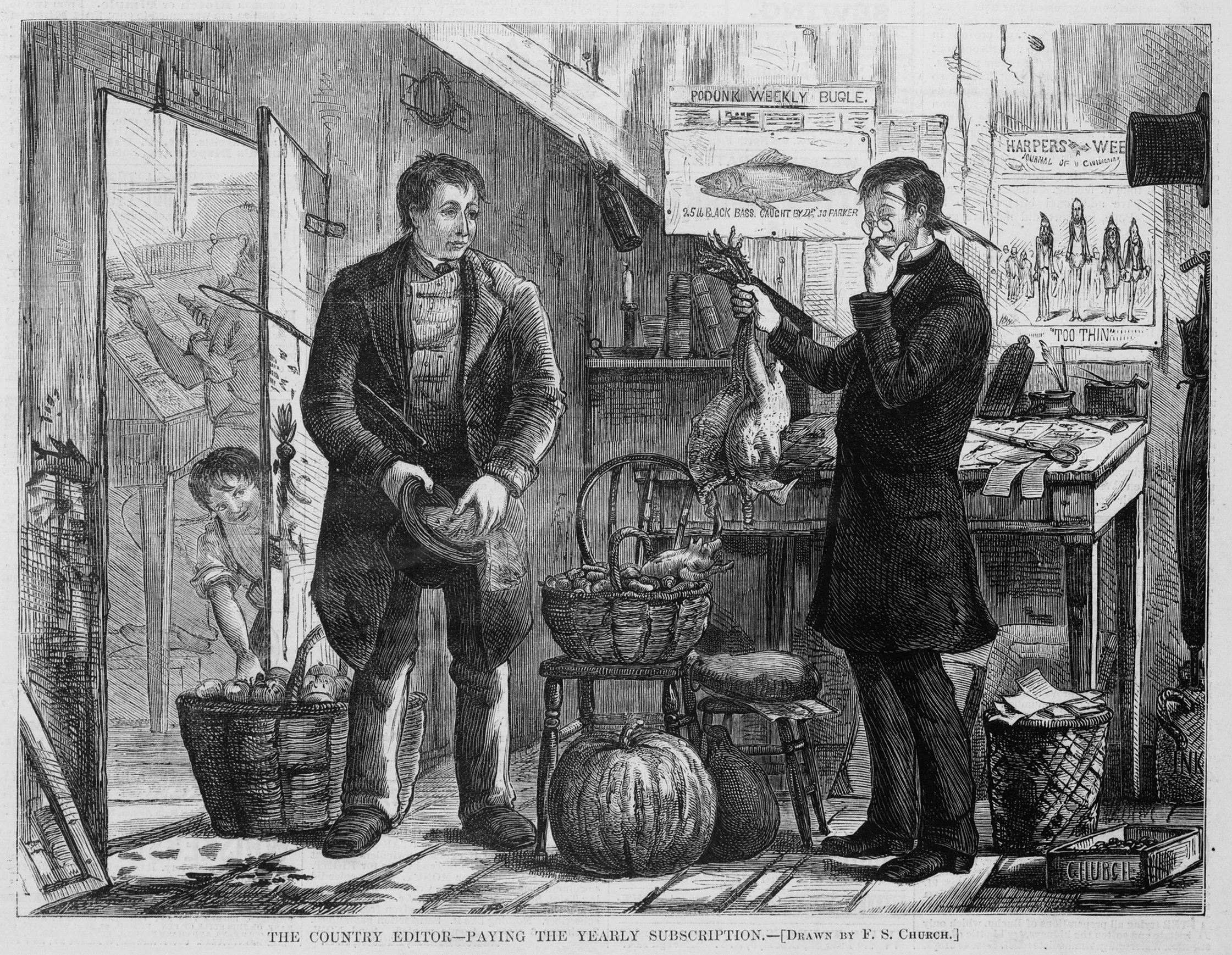
Barter
The exchange of one thing for another without the use of money is called barter , and this was the way that early trade took place.
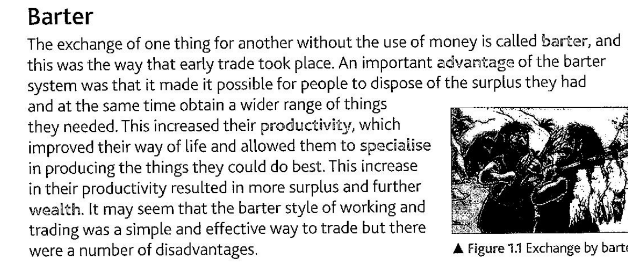
2
New cards
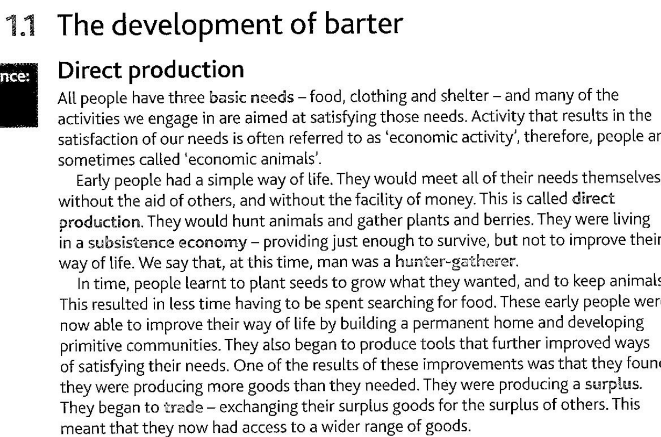
Barter
Direct production :
All people have three basic needs -food, clothing and shelter -and many of the activities we engage in are aimed at satisfying those needs. Activity that results in the satisfaction of our needs is often referred to as 'economic activity', therefore, people ar sometimes called 'economic animals'.
Early people had a simple way of life. They would meet all of their needs themselves without the aid of others, and without the facility of money. This is called direct production. They would hunt animals and gather plants and berries. They were living in a subsistence economy - providing just enough to survive, but not to improve their way of life. We say that, at this time, man was a hunter-gatherer.
All people have three basic needs -food, clothing and shelter -and many of the activities we engage in are aimed at satisfying those needs. Activity that results in the satisfaction of our needs is often referred to as 'economic activity', therefore, people ar sometimes called 'economic animals'.
Early people had a simple way of life. They would meet all of their needs themselves without the aid of others, and without the facility of money. This is called direct production. They would hunt animals and gather plants and berries. They were living in a subsistence economy - providing just enough to survive, but not to improve their way of life. We say that, at this time, man was a hunter-gatherer.
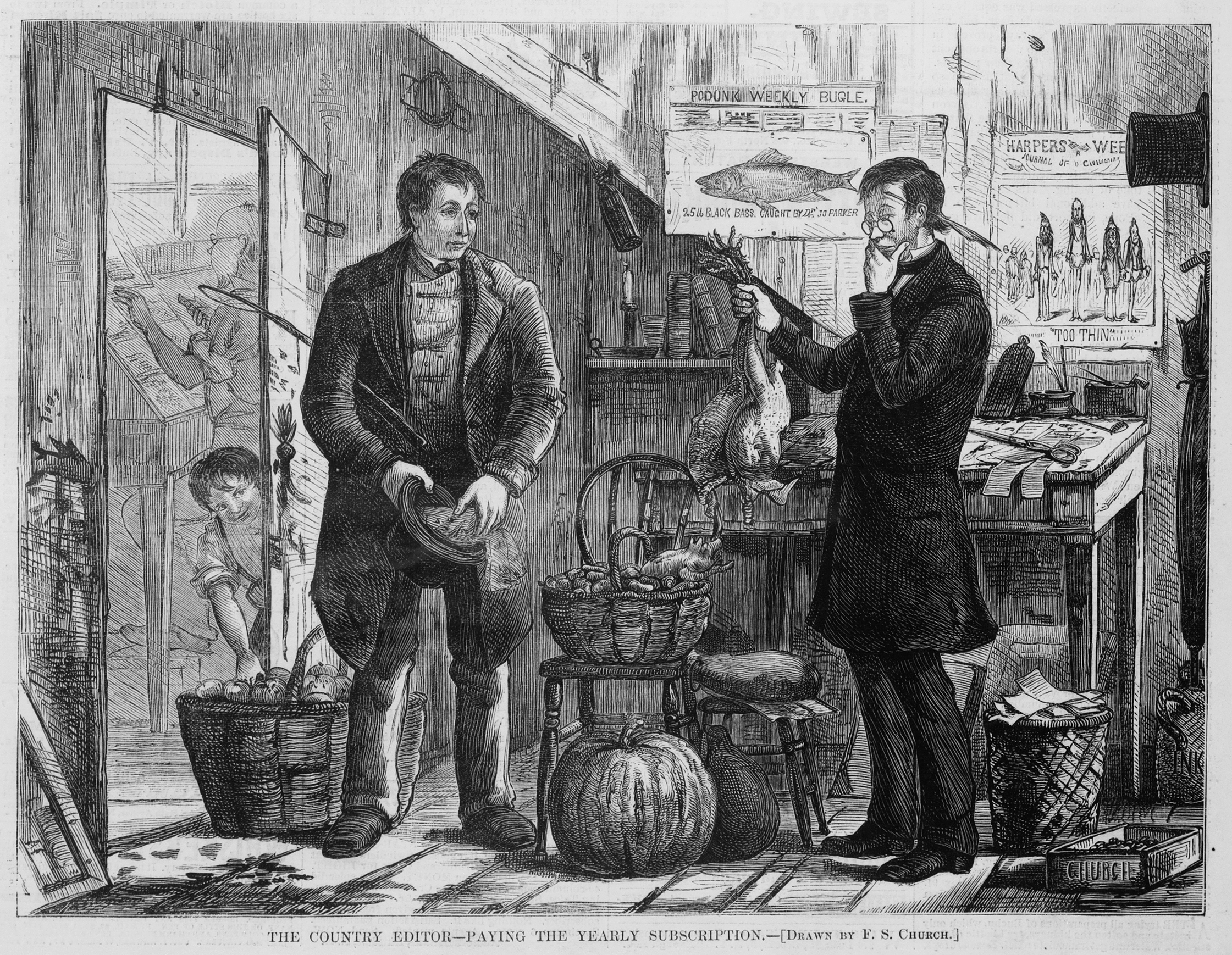
3
New cards
Barter
In time, people learnt to plant seeds to grow what they wanted, and to keep animals. This resulted in less time having to be spent searching for food. These early people were now able to improve their way of life by building a permanent home and developing primitive communities. They also began to produce tools that further improved ways of satisfying their needs. One of the results of these improvements was that they found they were producing more goods than they needed. They were producing a surplus. They began to trade - exchanging their surplus goods for the surplus of others. This meant that they now had access to a wider range of goods.
4
New cards
Barter
An important advantage of the barter system was that it made **it** possible for people to dispose of the surplus they had and at the same time obtain a wider range of things they needed. This increased their productivity, which improved their way of life and allowed them to specialise in producing the things they could do best. This increase in their productivity resulted in more surplus and further wealth. It may seem that the barter style of working and trading was a simple and effective way to trade but there were a number of disadvantages.
5
New cards
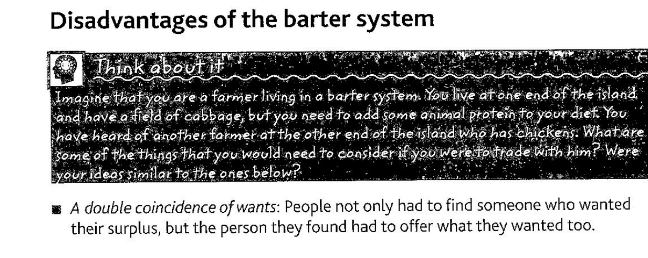
Barter
**Disadvantages of** the barter **system**
Think about it
**▲** Figure 1.1 Exchange by barter
Imagine that *you* **are** a farmer living in a barter **system.** You **live** at one **end** of the island and *have* a field of cabbage, but **you** need to add some animal **protein** to your diet. You **have** heard **of another** farmer **at** the other
nd of the island who has chickens. What are **Some** of the things that **you** would **need** to consider if you were to trade with him? Were your ideas similar to the ones below?
*A double coincidence of wants*: People not only had to find someone who wanted their surplus, but the person they found had to offer what they wanted too.
Think about it
**▲** Figure 1.1 Exchange by barter
Imagine that *you* **are** a farmer living in a barter **system.** You **live** at one **end** of the island and *have* a field of cabbage, but **you** need to add some animal **protein** to your diet. You **have** heard **of another** farmer **at** the other
nd of the island who has chickens. What are **Some** of the things that **you** would **need** to consider if you were to trade with him? Were your ideas similar to the ones below?
*A double coincidence of wants*: People not only had to find someone who wanted their surplus, but the person they found had to offer what they wanted too.
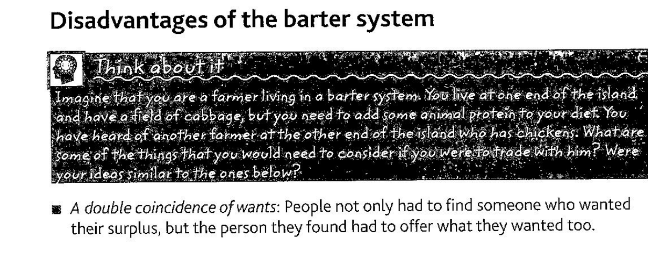
6
New cards
Barter examples
*An exchange rate:* Having found others who wanted what they had to offer, early traders still had to agree on the quantities of each other's goods that were to be exchanged. Imagine the difficulty in deciding how many chickens to exchange for an axe head.
7
New cards
Barter Examples
*Divisibility of goods*: Some rates of exchange did not make it possible to trade because goods could not be split into smaller parts. For example, if one axe head was worth half a live pig, then it was not possible *to* trade with one axe head because you cannot have half a pig and also have it alive.
8
New cards
Barter Examples
*Storage of wealth:* Many goods which had been exchanged could not be saved for use at a future date because many such items could not be stored for a long period of time.